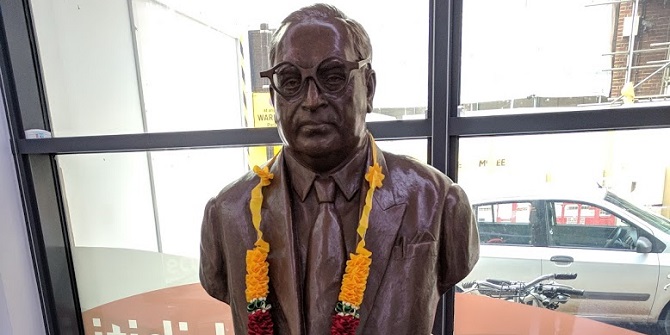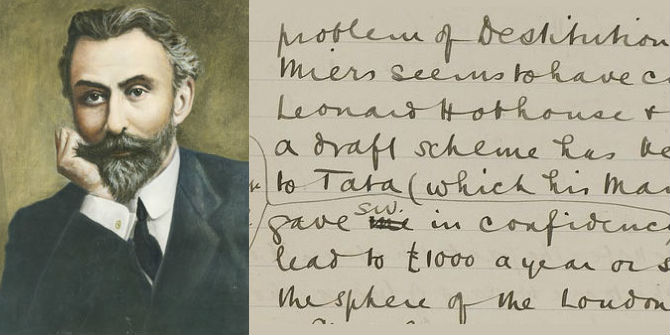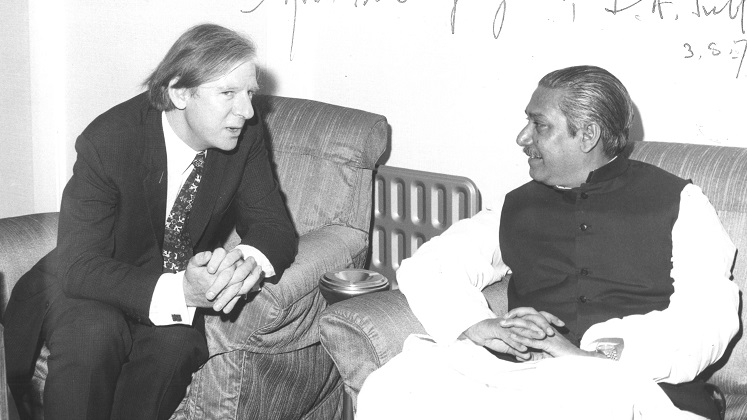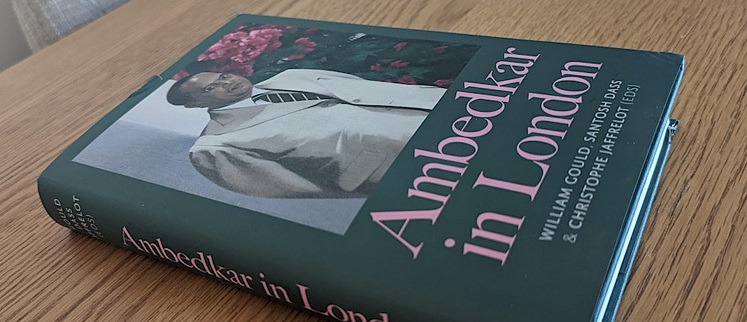In April 2024, the India Observatory at LSE held a conference to mark the anniversary of Dr B R Ambedkar’s PhD thesis, The Problem of the Rupee. Dr Ajay Arun Dhawale recounts his experience of travelling to London to attend and speak at the event.
I have always cherished my dream of visiting the London School of Economics and Political Science (LSE). The institution holds a special place in my heart, primarily because Dr B R Ambedkar, a visionary and a pivotal figure in Indian history, completed his DSc there. His monumental work, “The Problem of the Rupee: Its Origin and Its Solution,” has been a beacon for scholars and policymakers alike.
To honour the centenary of this thesis, the London School of Economics, the University of Mumbai, and BARTI (Dr Babasaheb Ambedkar Research and Training Institute) organised an international conference on “Sustainability, Inclusive Development, and Dr B R Ambedkar.” The opportunity to present my research article at this prestigious conference was a dream come true, and the experience was nothing short of extraordinary.

When I received the email from LSE inviting me to present my paper, I was overwhelmed with joy and excitement. It felt surreal as if a long-cherished dream was finally coming to fruition. The title of my paper, “Dr Ambedkar’s Vision and the Resilience of Dalit Literature and Cultural Transformation,” was close to my heart, and the chance to present it at LSE was an honour beyond words. The conference was scheduled around Ambedkar Jayanti, adding a layer of significance to the event. Presenting my research on Dr Ambedkar’s birthday at the very institution where he had studied was profoundly symbolic and deeply emotional for me.
As the plane descended into London, a wave of excitement and anticipation washed over me. The city’s rich history and cultural diversity were palpable from the moment I set foot on its streets. London’s charm was intoxicating, with its blend of historic landmarks and modern marvels. However, my primary focus was the conference at LSE, and the days leading up to my presentation were filled with a mix of preparation and exploration.
The conference itself was a grand affair, bringing together scholars and experts from various fields to discuss sustainability and inclusive development through the lens of Dr Ambedkar’s work. Walking into LSE, I felt a sense of pride and responsibility. The campus buzzed with intellectual energy, and the atmosphere was enthusiastic. The inaugural function of the conference was a fitting tribute to Dr B R Ambedkar’s legacy, bringing together influential voices to reflect on his contributions and discuss pathways for future development.
Dr Ruth Kattumuri’s comprehensive introduction, Vice Chancellor of LSE Larry Kramer’s welcome remarks and Nicholas Stern’s inspiring keynote address collectively set a high standard for the conference. They provided a robust framework for the following discussions, ensuring that the themes of sustainability and inclusive development remained at the forefront of the dialogue. The event honoured Dr Ambedkar’s legacy and reinforced the importance of continued efforts towards achieving a just and equitable society.
Presenting my paper was a transformative experience. Standing at the podium, I could feel the presence of history, the legacy of Dr Ambedkar, and the collective aspirations of countless individuals striving for social justice. My paper delved into the profound impact of Dr Ambedkar’s vision on Dalit literature and the broader cultural transformation it has spurred. The resilience and creativity of Dalit writers have not only enriched Indian literature but also provided a powerful medium for expressing the struggles and aspirations of marginalised communities. The response from the audience was overwhelmingly positive. Scholars and students engaged in a lively discussion, sharing insights and drawing connections between Dr Ambedkar’s ideas and contemporary issues. The opportunity to exchange ideas with such a diverse and knowledgeable group was incredibly enriching.
April 14th, Ambedkar Jayanti, was a day of immense significance. I was privileged to visit Dr Ambedkar’s house in London, a pilgrimage for anyone who admires his work. The visit was a poignant reminder of his remarkable journey and the sacrifices he made for social justice. The house, now a museum, preserves the memory of his time in London and his enduring legacy. On this auspicious day, I was honoured with the Bhim Sphurti award from Prabuddha International. Receiving this award on Ambedkar Jayanti, in a city that played a crucial role in Dr Ambedkar’s academic and intellectual development, was a deeply moving experience. It was a moment of personal triumph and reaffirming my commitment to continue working towards the ideals Dr Ambedkar advocated.
While the conference and the award ceremony were the highlights of my trip, the beauty of London and the surrounding cities added an unforgettable dimension to my journey. London, with its iconic landmarks like the Tower of London, Buckingham Palace, and the British Museum, offered a fascinating glimpse into its rich history and vibrant culture. Each street and corner seemed to tell a story, and I immersed myself in the city’s unique blend of the old and the new.
My travels didn’t stop in London. I visited Cardiff University, a serene and picturesque campus that exuded academic excellence. The visit to Oxford University was equally inspiring. Walking through its historic halls and libraries, I could feel the weight of centuries of scholarship and intellectual pursuit. The final leg of my academic tour took me to Edinburgh University, where the city’s breathtaking architecture and scenic beauty left me spellbound.
Looking back, I can say with certainty that those days were some of the most beautiful and enriching experiences of my life. The journey was not just about presenting a paper or visiting prestigious universities; it was about connecting with a legacy, celebrating a vision, and being part of a larger narrative of social justice and intellectual pursuit. The memories of my time in London and the other universities are etched in my heart. They serve as a constant reminder of the power of dreams, the importance of perseverance, and the profound impact of visionary leaders like Dr B R Ambedkar. My journey to the London School of Economics was more than an academic endeavour; it was a tribute to a great man’s legacy and a celebration of the enduring power of knowledge and resilience.
More about the conference
The India Observatory at International Inequalities Institute, LSE, in collaboration with University of Mumbai, India & BARTI Institute, Pune, India, organised a two-day conference titled “Sustainability, Inclusive Development and Dr B R Ambedkar” 13-14 April 2024 to celebrate the centenary of Ambedkar’s PhD at LSE. The video from the opening ceremony can be found here:





